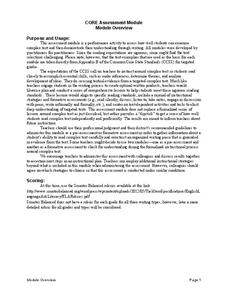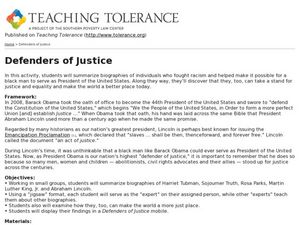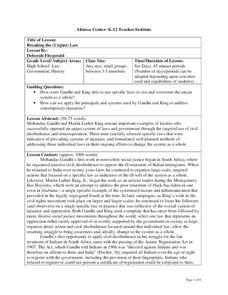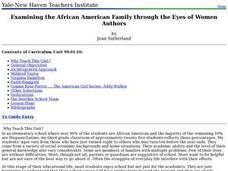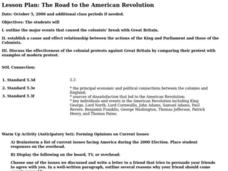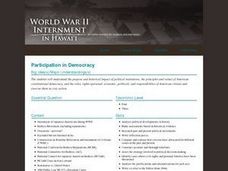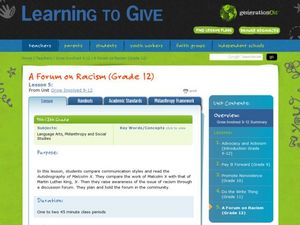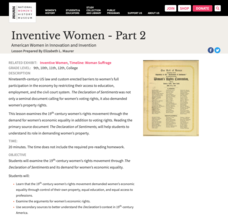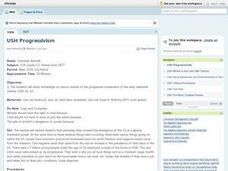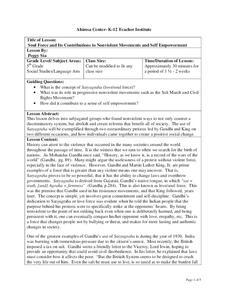Atlanta History Center
What if YOU Lived During Jim Crow?
Young historians envision what life was like for African Americans living in the Jim Crow South through hands-on, experiential activities.
Brownsville Independent School District
Moral Courage
What does a morally courageous person look like? Discuss principles, peer pressure, and solving problems without violence in a worksheet about moral courage, and the ways you can be a hero to the people around you.
California Education Partners
Women
Alice Walker's poem "Women" provides ninth graders the opportunity to demonstrate their ability to identify how a writer's choice of syntax and diction contribute to the development of the theme of the work.
Stanford University
United Farm Workers
What do primary sources tell people about important events in history? The assessment geared toward high school social studies focuses on primary sources. Learners analyze a poster and a blueprint to determine how the documents show the...
Curated OER
The Evolution of Transcendentalism
Key concepts, major writers, and historical events related to Transcendentalism are explored in a student-produced PowerPoint about this movement. The presentation could be used as an introduction to a unit or as a model that class...
Curated OER
Perseverance and the First Amendment
Students investigate the right to petition and assemble. In this Bill of Rights instructional activity, students read the First Amendment and discuss the rights guaranteed by the amendment. Students research selected groups and movements...
Curated OER
Defenders of Justice
Students research abolitionists, civil rights advocates, and their allies to learn about racism and justice. In this racism and justice lesson, students define justice and sing a song about activism. Students review the biographies...
Curated OER
Breaking the Unjust Law
Students consider the concept of civil disobedience. In this lesson on changing unjust laws, students use primary sources to understand how Gandhi and King changed the law. Students will then list laws that they feel are unjust and plan...
Curated OER
Parenting in the Movies:Examining Responsibilities in Modern American Films
Young scholars use films to identify the characteristics of a good parent. In groups, they research the different types of parenting methods used during colonial times, the Civil War and the Civil Rights movement. As a class, they...
Curated OER
Examining the African American Family through the Eyes of Women Authors
Students read stories by women authors on the characteristics of the African-American family. Using the internet, they research the history of issues that have affected African-American families from the Civil War to the Civil Rights...
Curated OER
Forward March: Continuing Frederick Douglass' Footsteps
Students view numerous artifacts from the life of Frederick Douglass. Using the objects, they discover the many parts of his life and develop a hypothesis about the significance of the objects in his life. They identify the...
Curated OER
The Road to the American Revolution
Students consider the case for forming a new, independent nation. In this American Revolution lesson, students examine the people, places, and events that led to the outbreak of war in the colonies. Students compare colonial protests to...
Curated OER
Participating in Democracy
Students analyze film clips in class. In this democracy lesson plan, students identify the differences between civil liberties, democracy and freedom. Students view a video regarding Japanese internment and answer study questions as well...
Curated OER
Quotations of Martin Luther King, Jr.
In this quotations worksheet, students read and analyze 7 quotations by Martin Luther King, Jr. Students match each quote to the correct interpretation.
Curated OER
Martin Luther King, Jr.
Students learn what goals Dr. Martin Luther King, Jr. had when he wanted to change the inequality of the United States.
Curated OER
A Forum on Racism
Twelfth graders compare and contrast the work of Malcolm X and Martin Luther King, Jr. In this racism lesson, 12th graders read The Autobiography of Malcolm X and discuss how Malcolm X and Martin Luther King, Jr. approached ending racism.
Curated OER
Reconstruction (1865–1877)
In this online interactive history worksheet, students respond to 7 short answer and essay questions about the causes and effects of Reconstruction following the American Civil War.
National Woman's History Museum
Inventive Women - Part 2
The Declaration of Independence was published in 1776. The Declaration of Sentiments and Resolutions, modeled after the Declaration of Independence, was drafted and read by Elizabeth Cady Stanton at the Seneca Falls Convention in 1848....
West Virginia Department of Education
Declarations and the Quest for Life, Liberty and the Pursuit of Happiness
Understanding how John Brown got his inspiration from the Declaration of Independence helps learners further understand both West Virginia and United States history. The resource, a standalone, uses worksheets, discussion, and essay...
Alabama Department of Archives and History
What Were They Thinking? Why Some Some Alabamians Opposed the 19th Amendment
To better understand the debate over the 19th Amendment, class members examine two primary source documents that reveal some of the social, economic, racial, and political realities of the time period.
Curated OER
Concept Formation Lesson Plan: Understanding "Protest"
After analyzing both examples and non-examples of a variety of protests conducted by ethnic groups in Seattle and the state of Washington during the twentieth century, your class members will work to identify the key ideas and components...
Curated OER
Nativist and Racist Movements in the U.S. and their Aftermath
Students examine the nativist and racist movements in the history of the United States. In groups, they analyze the reactions of religious and ethnic groups to these movements and create a chart to compare the goals of each group. To...
Curated OER
USH Progressivism
Eleventh graders explore, analyze and interpret various strands of the progressive movements of the early twentieth century. They cover the background of child labor laws, Susan B. Anthony's 1873 court speech and alcohol issues in the...
Curated OER
Soul Force and Its Contributions to Nonviolent Movements and Self Empowerment
Fifth graders explore the concept of Satyagraha. In this nonviolent resistance lesson, 5th graders listen to a lecture about Gandhi's teachings and determine how the soul force contributes to a sense of self empowerment.
Other popular searches
- Civil Rights Movement Music
- American Civil Rights Movement
- 1960's Civil Rights Movement
- Jfk Civil Rights Movement
- U.s. Civil Rights Movement
- Us Civil Rights Movement
- Jr. And Civil Rights Movement
- 1960s Civil Rights Movement
- Civil Right Movement Kit
- Jr and Civil Rights Movement
- Civil Rights Movement Unit
- The Civil Rights Movements




